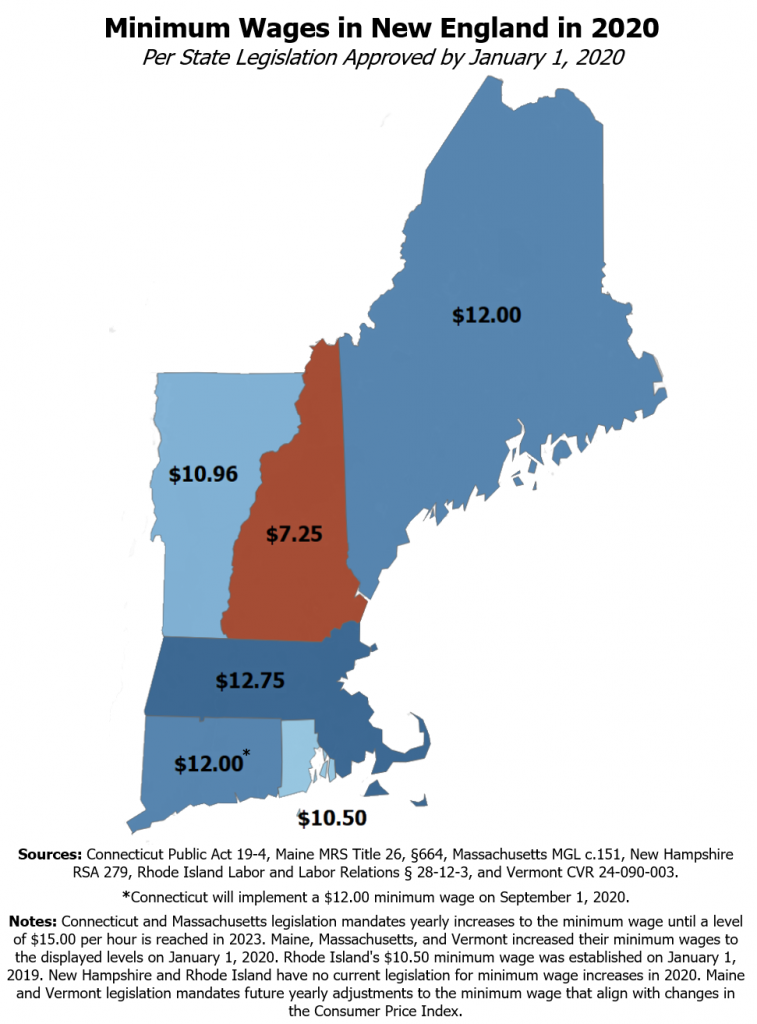The federal minimum wage is the lowest hourly wage that can be paid to most workers anywhere in the nation. Since its inception at the national level in 1938, when only certain workers were covered, the wage has increased and encompassed more types of employees over time. State law sets New Hampshire’s minimum wage to the federal minimum level, currently at $7.25 per hour. An individual working 40 hours per week at this wage will make about $15,000 per year, assuming they work all 52 weeks. This income level is below the federal poverty guidelines for all households other than a single person, and well below the levels for households that include a partner and children.
Since the late 1960s, the periodic increases made to the federal minimum wage have not kept up with inflation, and thus have been less effective at helping ensure workers receiving the minimum wage can afford basic necessities. A fixed minimum wage in dollars declines in real value over time, as it does not keep up with the increasing cost of living.
The federal minimum wage has remained at $7.25 for more than a decade; it was last raised in 2009. When inflation-adjusted to 2019 dollars, an individual making the minimum wage in 2009 took home about 17 percent more pay, in terms of real purchasing power, than an individual making $7.25 an hour in 2019. This decline is due to inflation and the increasing costs of goods and services over the last decade.
The ten years since the last increase in the federal minimum wage has been the longest period the wage has gone without an increase. Many states have instituted and independently raised their own minimum wages to combat growing income inequality and the reduction in purchasing power of individuals engaged in low-wage work. All New England states except New Hampshire have taken steps to increase their minimum wages in recent years, with some planning future increases that are calculated automatically based on inflation. Many of New Hampshire’s neighbors are ringing in the New Year with minimum wage increases in 2020 that will likely boost wages for many working individuals and families.
Massachusetts has the highest minimum wage levels in New England for 2020. On January 1, 2020, the minimum wage in the state for most workers rose to $12.75 per hour. Legislation in the state mandates yearly increases through 2023, when the minimum wage will be $15 per hour. Maine raised the minimum wage for most workers in the state to $12.00 per hour on January 1, 2020. Legislation in the state also mandates that future yearly increases to the minimum wage will occur and be calculated using the Consumer Price Index, a measure of inflation. Connecticut will increase the state minimum wage to $12.00 on September 1, 2020. Like Massachusetts, legislation in Connecticut mandates yearly minimum wage increases until a $15 per hour level is reached in 2023. Vermont increased the state’s minimum wage to $10.96 per hour for most workers. Like Maine’s planned future increases, Vermont’s yearly minimum wage increases are automatic and calculated using changes to the Consumer Price Index. Rhode Island has no current plans to raise its minimum wage in 2020, but last increased the minimum wage on January 1, 2019, to $10.50 per hour for most workers.
New Hampshire is the only state in New England following the federal minimum wage of $7.25 per hour, and the only New England state with a minimum wage below $10.50 per hour. With an extraordinarily tight labor market and low unemployment rates, the competition for employees can be intense as employers struggle to fill positions. Because New England is a geographically small region, areas in New Hampshire that border other states with higher minimum wages may experience an even more pronounced shortage of workers, as individuals cross state lines in search of increased wages. This shortage does put some upward pressure on wages in New Hampshire.
The higher minimum wages of others states may prompt employers in New Hampshire to increase wages, but not necessarily to the levels matching estimates of the cost of living in the state. According to U.S. Census Bureau’s Current Population Survey data, analyzed by the Economic Policy Institute, 10 percent of workers aged 18 to 64 in New Hampshire earned an hourly wage equivalent to $10.38 per hour or less in 2018, and about 20 percent earned the equivalent of $12.88 per hour or less. About 30 percent of New Hampshire workers aged 18 to 64 made less than $15.08 per hour in 2018. If the upward pressure on wages in the labor market were enough to sufficiently boost worker incomes relative to the minimum levels required by neighboring states, about one out of every ten workers in New Hampshire would not have wages lower than the minimums set in any other state in New England.
To read more about the New Hampshire economy and costs of living, see NHFPI’s August 2019 Issue Brief, New Hampshire’s Workforce, Wages, and Economic Opportunity.
– Michael Polizzotti, Policy Analyst

